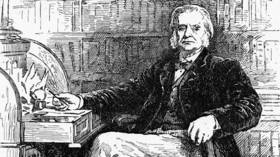Scientists call not to ‘cancel’ late biologist Thomas Huxley

Dozens of leading UK scientists called on Imperial College London not to demonize 19th century biologist Thomas Huxley, blasting accusations against him of ‘scientific racism’ as unfair and underlining that the key supporter of Darwin was “an ardent abolitionist.”
The group of 39 academics, which includes Prof. Richard Dawkins and Nobel laureate Prof. Paul Nurse, wrote a letter to The Telegraph explaining why Huxley cannot be considered as racist.
The letter has become a response to a report by an independent history group, tasked, in the wake of the 2020 Black Lives Matter protests, with analyzing Imperial College’s “links to the British Empire” which allegedly prevented the university from becoming a “fully inclusive organization.” They came to the conclusion that Huxley, despite being an abolitionist, had fallen “far short of Imperial’s modern values” and “might now be called racist,” as his essay ‘Emancipation - Black and White’ espoused “a racial hierarchy of intelligence.” Therefore, the group recommended renaming a university building, which carries the name of one of Imperial College’s founders, and to remove a bust of Huxley.
The accusations and recommendations have been condemned in a letter to The Telegraph, signed by, among others, 17 Imperial College academics.
“Huxley was an ardent abolitionist who fought the virulent pro-slavery scientific racism of his day and publicly welcomed the defeat of the Confederacy in 1865,” they wrote.
Admitting that the anthropologist believed in a hierarchy of races at the beginning of his career, they say that, with age, “he became skeptical of racial stereotypes.”
Huxley’s defenders underlined that the scientist “reformed London’s schools, was a principal of a working men’s college, wrote volumes of journalism, gave lectures for working people and opened his classes to women,” while also being “instrumental in founding the Royal College of Science, later Imperial College, the very institution that now seeks to disown him.”
A spokesman for Imperial College said that the institution’s management will come up with its proposals on the course of action in February, The Telegraph has reported.













